Using 8,400 eggs, 25kg of venison sausage and 14 bottles of salt and pepper, New Caledonia’s giant omelette festival aims to bring people together in a region that is often divided.
“It is important to have festivals like this. The giant omelette is a symbol of sharing,” says veteran chef Reine Chenot.
She wears a crisp-white uniform, a tall hat and a bright red ribbon which denotes her as “the master”. It is a title that fits Chenot who coordinates a well-oiled team of “omelette-iers” that includes 14 chefs and a handful of volunteers to feed thousands of people at the annual fête de la ville de Dumbéa (festival of the city of Dumbéa).
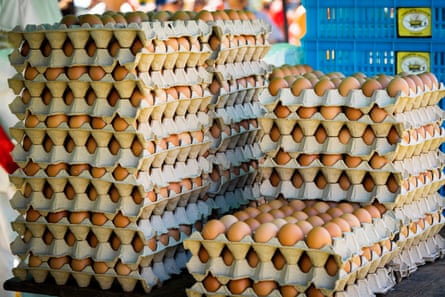
Chenot says the giant omelette festival has got “bigger and bigger” over its 40-year-history.
It was introduced in 1984 by a New Caledonian woman, Madame Radotin, who hoped the French tradition would bring together the local community during a period of extreme political division, including the assassination of pro-independence leader Louis Tjibaou.
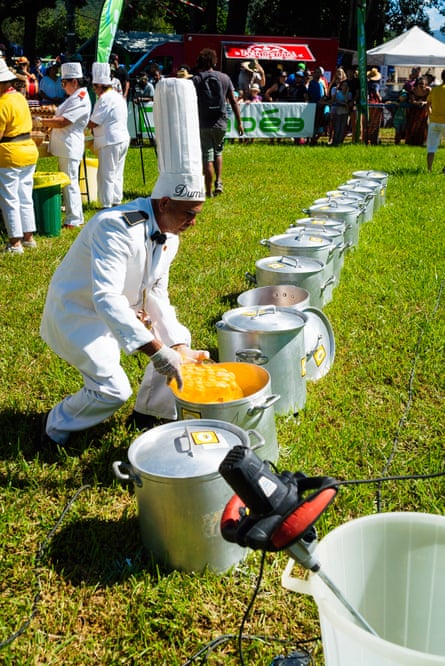
Colonised in 1853, New Caledonia is a French territory which has undergone three independence referendums in recent years, with all three resulting in the decision to remain with France. The last poll, in 2021, was marred by a boycott by the indigenous Kanak people and the independence movement is still pushing for another vote.
The omelette-making ceremony, which traditionally takes place on the first weekend after Easter, kicks off with a parade around the park, led by a marching band. The chefs carry planks loaded with bread, baskets of eggs, and proudly display the mini gold frying pans attached to their lapels which denote them as “Knights of the Giant Omelette”.
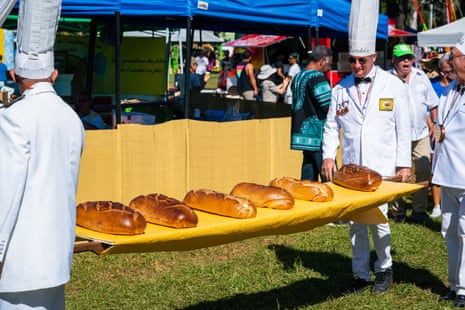
The title of “knight” is bestowed upon new chefs when they swear to uphold the traditions of the giant omelette.
The team of chefs crack thousands of eggs over a one-hour-period before they are poured into 12 metal pots.
Once the eggs reach the pots they are churned with power tools, usually reserved for mixing concrete; they are the only tools up to the task. Once the mixture is churned, the chefs add 14 bottles of salt and pepper.
Forming a circle around the fire, the chefs take up long metal rakes to stoke the hot coals before a forklift hoists the giant frying pan over the fire.
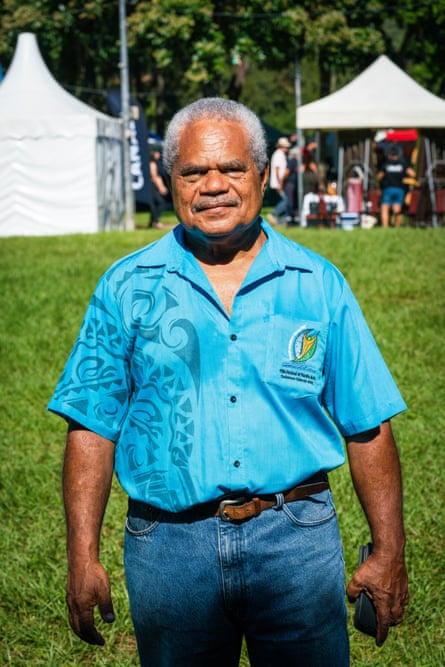
“You have to make sure the omelette is not overcooked due to the size of the pan. This is why we use the giant wooden spatulas,” says Chenot.
The specially made spatulas scrape across the 3.5-metre-wide pan to push the egg mixture into folds.
Just before the omelette is finished cooking, 25kg of venison sausage is added, an ingredient which makes the omelette uniquely Caledonian, according to Chenot. Deer are an invasive pest across the island and are commonly hunted for meat. After 45 minutes, 3,000 portions of fragrant omelette are served up to the crowd.
One of those present is local Kanak man Martin Hyaleyap. He says the festival gives him hope for the future.
“I love this omelette festival because it brings people together … We don’t know the future of New Caledonia, whether it would be independence or not independence, this festivity shows to everybody that New Caledonia can do anything together,” he says.
For Steve Kiel, the visiting mayor of Port Vila, Dumbéa’s twin city in Vanuatu, the festival is also an important symbolic occasion and an informal arena for Pacific regionalism and the highlighting of its cultures.
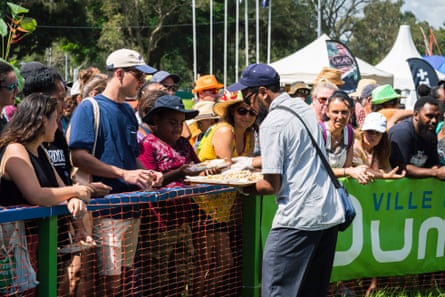
“It is my first time eating the giant omelette and for me, it is part of the Melanesian culture. Sitting together, eating together … it shows unity of the people,” he says.

